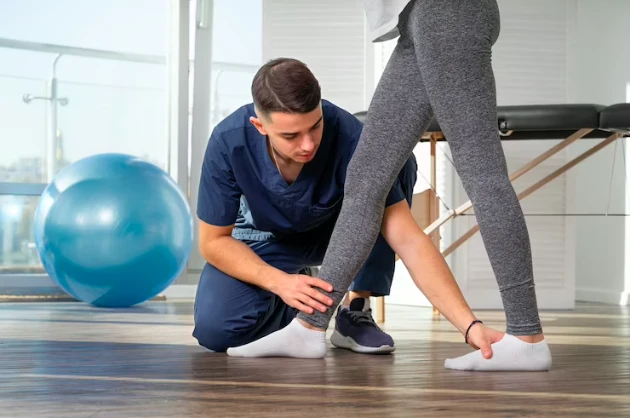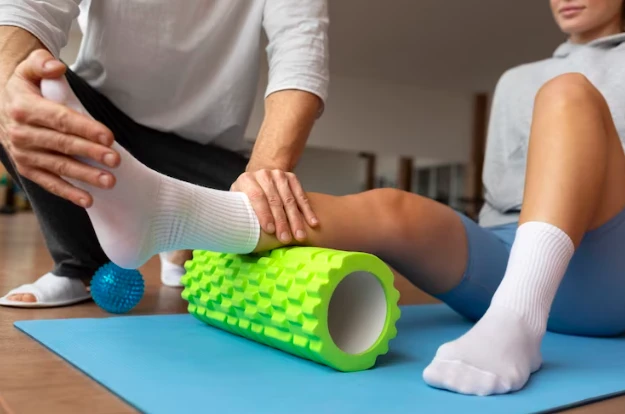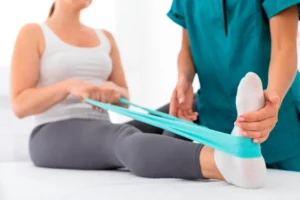Physical therapy is a form of healthcare that utilizes exercise, manual therapy, and other techniques to help individuals recover from injuries and improve their physical abilities. Marathon runners, in particular, can benefit greatly from this. Physiotherapy can enhance the performance of runners by optimizing their physical condition through targeted exercises and techniques allowing them to run longer, faster and with less risk of injury.
Here are some ways in which physical therapy can be helpful to marathon runners:
1. Injury Prevention: Physical therapists can help runners identify any muscle imbalances or weaknesses that could lead to injury. Common running injuries that physiotherapy can prevent include shin splints, IT band syndrome, plantar fasciitis, Achilles tendinitis, patellofemoral pain syndrome, and stress fractures. By addressing these issues and optimizing the body’s physical capabilities, physiotherapy can help runners reduce the risk of injury and perform at their best. They can then develop a personalized exercise program to address these issues and strengthen the affected muscles. This can help reduce the risk of injury and allow runners to perform at their best.
2. Rehabilitation: If a runner does suffer an injury, physiotherapy can help speed up the recovery process. Rehabilitation plays an important role in sports injury because it helps athletes recover from injuries, regain strength and mobility, and prevent future injuries. Basic physiotherapy techniques used may include range of motion exercises, strengthening exercises, soft tissue mobilization, heat or ice therapy and so on. These techniques can help reduce pain, inflammation, and muscle tension, while improving mobility, flexibility, and strength to aid in the healing process.

3. Flexibility: Flexibility is an essential aspect of running, as it can help prevent muscle strains and other injuries. Physical therapists can work with runners to develop a stretching routine that is tailored to their specific needs. Physiotherapists may recommend hamstring stretches, calf stretches, hip flexor stretches, quad stretches, and IT band stretches to enhance flexibility in runners. Foam rolling and dynamic stretching may also be used to help loosen tight muscles and improve range of motion. This can help improve their flexibility and reduce the risk of injury.
4. Strength Training: Strength training is another important aspect of running, as it can help improve running efficiency, endurance, and overall performance. Physical therapists can develop a strength training program that is designed to improve the specific muscle groups used in running. This can help runners perform better and reduce the risk of injury.
5. Biomechanical Analysis: Physiotherapists can analyze a runner’s gait and running style to identify any issues that could lead to injury or affect their performance. They can then develop a plan to address these issues and help the runner improve their form.
6. Taping and Bracing: Many a time, physical therapists can use taping and bracing techniques to provide additional support and stability to injured or weak areas. This can help reduce the risk of further injury and allow the runner to continue training and competing.

7. Pain Management: Running can be a painful activity, especially for marathon runners who are pushing their bodies to their limits. In physiotherapy a range of techniques, such as massage and stretching, can help to manage pain and discomfort. This can enable runners continue to train and compete without being hindered by pain.
8. Nutrition and Hydration: Proper nutrition and hydration are essential for marathon runners, as they need to fuel their bodies for long-distance running. Physical therapists can provide advice on the best foods and drinks to consume before, during, and after running. This can help improve their performance and aid in recovery.
9. Mental Health: Marathon running can be mentally challenging, and physiotherapists can provide support and advice to help runners deal with the psychological aspects of training and competition. They can provide strategies for managing stress and anxiety, as well as techniques for maintaining motivation and focus.
In conclusion, physical therapy can be extremely beneficial for marathon runners. It can help prevent injuries, speed up recovery, improve performance, and provide support for the mental and physical aspects of training and competition. By working with a physiotherapist, marathon runners can develop a personalized plan to address their specific needs and achieve their goals.
Functional Manual Therapy®️ (FMT™️) @ VARDĀN, can provide an effective way to prevent, manage and rehabilitation of issues faced by runners and improve performance. By recommending personalised exercises to reduce pain and inflammation, improving range of motion, strengthening muscles, correcting posture and alignment, and providing education, our functional manual therapists can help us reduce any discomfort and restore normalcy to the affected area. If you are experiencing any pain related to your fitness, it is important to seek the advice at the earliest for faster recovery through a personalised and supervised treatment plan. To know more about (FMT™️) call us at : +91 011 43580720-22.




